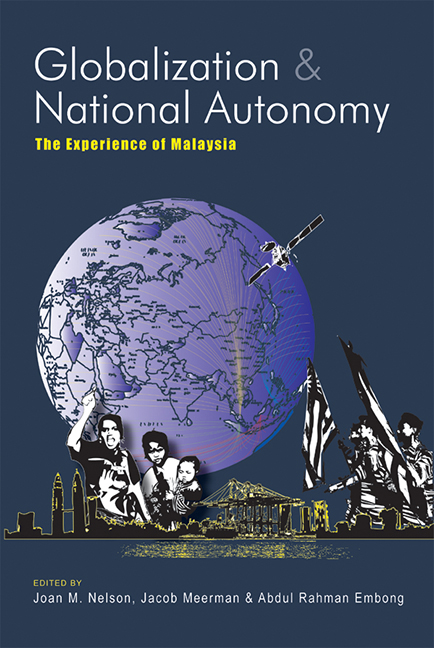Book contents
- Frontmatter
- Contents
- List of Abbreviations
- List of Tables and Figures
- Preface
- Contributors
- Chapter 1 Introduction
- Chapter 2 Developmentalist State in Malaysia: Its Origins, Nature, and Contemporary Transformation
- Chapter 3 The Look East Policy, the Asian Crisis, and State Autonomy
- Chapter 4 The Malaysian Success Story, the Public Sector, and Inter-ethnic Inequality
- Chapter 5 Poverty Eradication, Development, and Policy Space in Malaysia
- Chapter 6 Trade Liberalization and National Autonomy: Malaysia's Experience at the Multilateral and Bilateral Levels
- Chapter 7 Malaysia's Education Policies: Balancing Multiple Goals and Global Pressures
- Chapter 8 Malaysia's Healthcare Sector: Shifting Roles for Public and Private Provision
- Chapter 9 Globalization, Islamic Resurgence, and State Autonomy: The Response of the Malaysian State to ‘Islamic Globalization’
- Chapter 10 The National Culture Policy and Contestation over Malaysian Identity
- Chapter 11 Conclusions
- Index
Chapter 11 - Conclusions
Published online by Cambridge University Press: 21 October 2015
- Frontmatter
- Contents
- List of Abbreviations
- List of Tables and Figures
- Preface
- Contributors
- Chapter 1 Introduction
- Chapter 2 Developmentalist State in Malaysia: Its Origins, Nature, and Contemporary Transformation
- Chapter 3 The Look East Policy, the Asian Crisis, and State Autonomy
- Chapter 4 The Malaysian Success Story, the Public Sector, and Inter-ethnic Inequality
- Chapter 5 Poverty Eradication, Development, and Policy Space in Malaysia
- Chapter 6 Trade Liberalization and National Autonomy: Malaysia's Experience at the Multilateral and Bilateral Levels
- Chapter 7 Malaysia's Education Policies: Balancing Multiple Goals and Global Pressures
- Chapter 8 Malaysia's Healthcare Sector: Shifting Roles for Public and Private Provision
- Chapter 9 Globalization, Islamic Resurgence, and State Autonomy: The Response of the Malaysian State to ‘Islamic Globalization’
- Chapter 10 The National Culture Policy and Contestation over Malaysian Identity
- Chapter 11 Conclusions
- Index
Summary
The preceding chapters survey globalization's multiple impacts on Malaysian policies in the economic, social, cultural and religious realms. This concluding discussion summarizes the findings and also addresses some further questions. What factors or circumstances helped to preserve substantial autonomy with regard to economic and social policies? Are these factors likely to have similar effects in the future, or is Malaysia at a turning point? What broader reflections on globalization and autonomy can be drawn from Malaysia's experience?
Globalization's impacts extend far beyond the selection and implementation of government policies. Market pressures, for instance, may depress industrial wages. That impact may be heightened or diminished by government action; it may be consistent or in conflict with government goals. A different illustration: globalization's cultural influences may profoundly affect local tastes, values, and artistic expression, yet these influences operate largely independently of government policies. It is often difficult to disentangle effects on policy space from direct impact on outcomes. Insofar as possible, however, this survey has focused on globalization's effects on policy space — that is, autonomy and capacity.
Globalization affects policies both through constraints and through influence, although much of the discourse on globalization and autonomy is framed solely in terms of constraints on policy. Governments are described as adopting specific policies because they are in some sense forced to do so — as explicit conditions in multilateral agreements or conditions for aid, or to avoid adverse effects (reduced foreign investment, reduced ability to compete in international trade), or because some actions are necessary to support already established strategic choices. Governments may also be constrained to adopt particular measures because globalization has created strong demands among the public or specific interest groups (the “bottom-up route”). In all such cases, policies are adopted to avoid negative outcomes or as the price of increased benefits or opportunities. Governments may also introduce policies because they are influenced by external ideas or examples that point to previously unimagined opportunities or new approaches. Some of the effects of globalization on Malaysia's policies are better described as responses to influence and opportunities, rather than constraints.
- Type
- Chapter
- Information
- Globalization and National AutonomyThe Experience of Malaysia, pp. 301 - 330Publisher: ISEAS–Yusof Ishak InstitutePrint publication year: 2008



